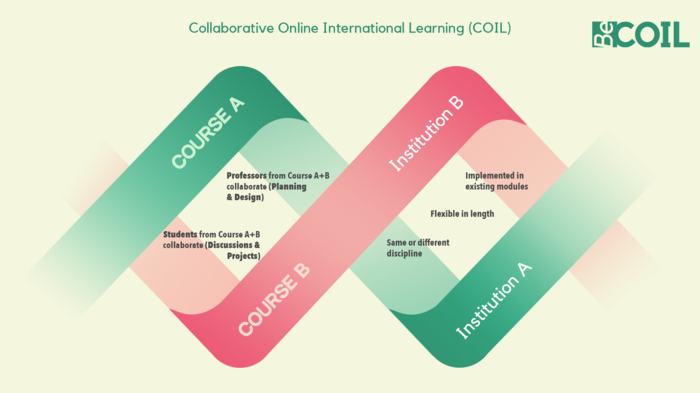About the Project
What is COIL?
Collaborative Online International Learning (COIL) is an approach to bring together students and lecturers across countries and cultures to learn, discuss and collaborate as part of an established class at two (or more) institutions. They aim to provide opportunities for global experiences built into the established study programs of universities. COILs are elements (e.g. small projects) that are integrated into existing modules and complement them with international online teaching and international virtual exchange.
Students are brought together across borders to tackle an assignment in teams. This form of virtual collaboration fosters digital and methodological skills for both students and teachers, and further promotes cultural insight and mutual understanding.
The COIL project will develop and establish international digital teaching and learning formats which, if successfully implemented, can be incorporated into the curriculum in the long term. This offers location-bound participants the opportunity to exchange ideas on an international level.
The focus of COIL is on the one hand the collaboration between students of different nationalities and at the same time the collaboration between the lecturers. The project benefits from the different experiences, perspectives and backgrounds of all participants.
COILs offer a good and forward-looking opportunity to link the study programs and cooperation with partner universities more closely. Professional, digital, personal and intercultural competencies are further developed.
Video: What is COIL?What can a COIL look like?
The following structure can serve as inspiration when designing a COIL project. We would like to point out that a COIL is only an element of the course, you are by no means required to teach your course virtually for the entire semester:
- An orientation or virtual introduction - icebreakers and similar elements are important here to encourage exchange among students and to compare viewpoints and knowledge.
- A common task: The project, which the students work on together in collaboration, forms the central aspect of a COIL. Students use their collective and individual knowledge to work on the task. They use tools and virtual platforms to make the exchange as effective as possible.
- A reflective assignment: At the end of the project, students are required to reflect upon the content of the module, the transcultural aspects of the project, and the virtual exchange.

